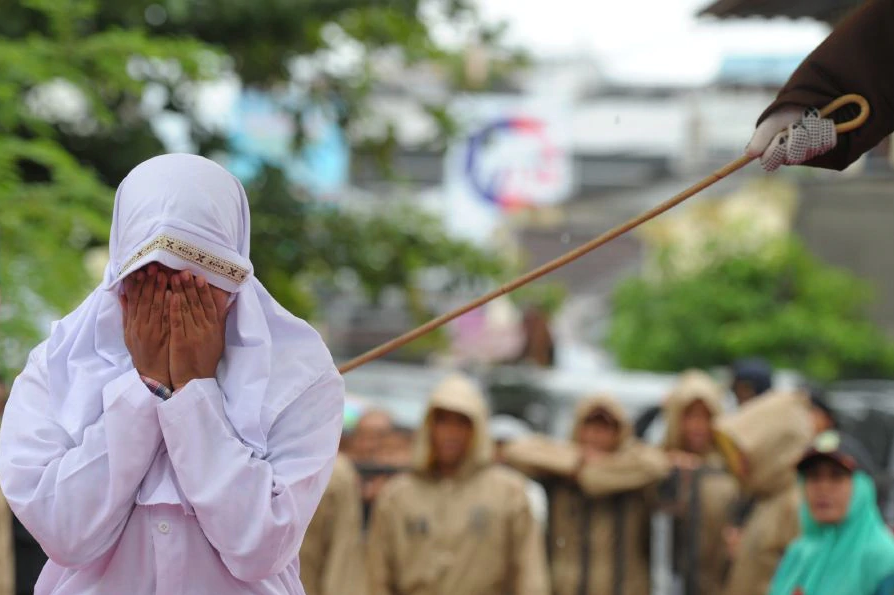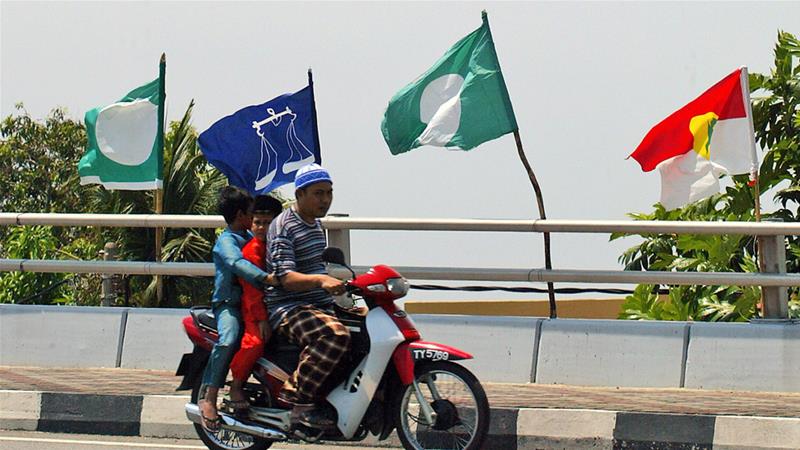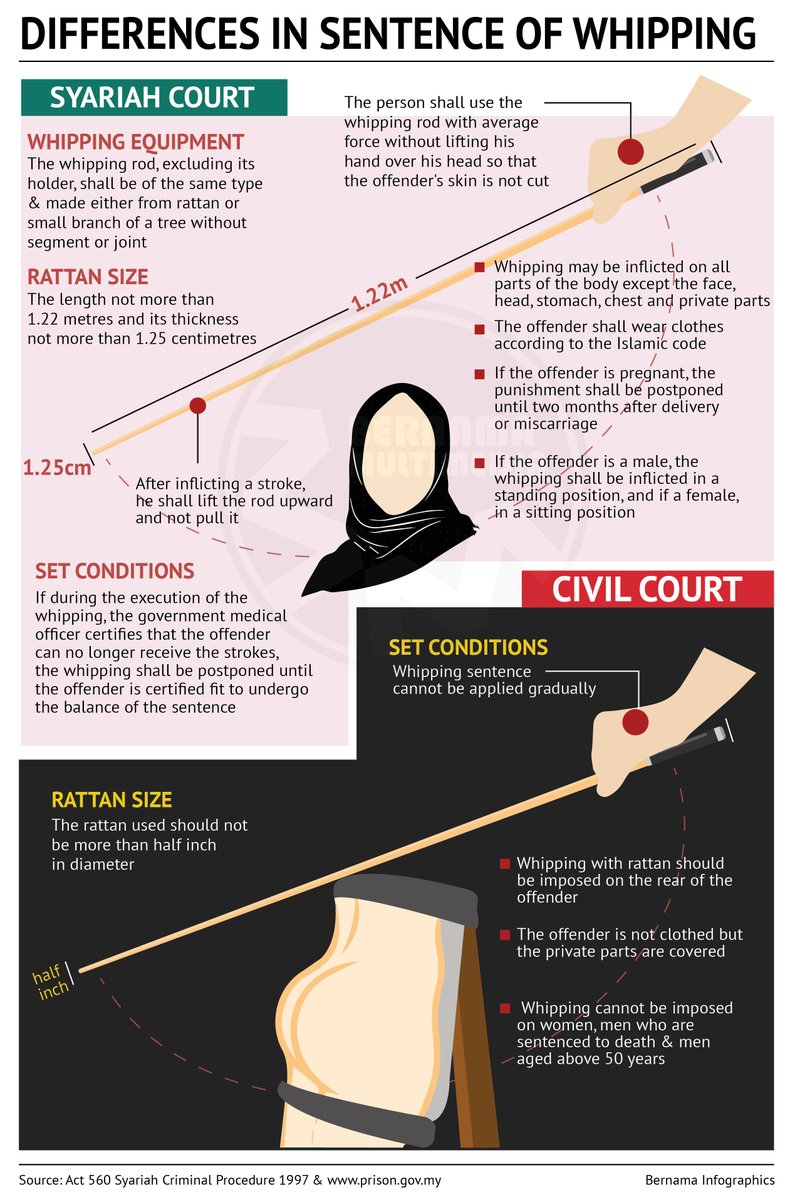Malaysia made headlines around the world once again in the past few days, but this time over an issue that has raised much debate within the community.
In other words, we became famous for not-very-nice things for the umpteenth time.
On Monday (3 September), two women were caned in public in Terengganu for attempting same-sex relations.

Caning is used as a form of legal corporal punishment in Malaysia. As you may have heard or seen (unfortunately), the consequences are quite gruesome because convicted criminals would end up with ripped skin after being whipped with no clothes on.
We don’t mean to place that graphic image in your head, but before you start dwelling on that, please read on.
This severe punishment does not apply to women because it is not allowed, under the civil law that is.
In Section 289 of the Criminal Procedure Code, corporal punishments against female prisoners regardless of age is prohibited.
However, under Islamic laws, caning women is allowed.

As you know, Malaysia is governed by two separate legal systems – the judicial law that pertains the entire Malaysian population and the Syariah law, which is specifically for Muslims.
Last year, a new law was approved in the state of Kelantan.
The state, governed by the Malaysian Islamic Party (PAS), amended its Syariah law to officially allow public canings.
According to Bernama, the Kelantan Syariah Criminal Procedure Enactment 2002 (Amendment 2017) was part of an effort to reorganise sentencing under the Islamic criminal law, which allowed caning to be conducted inside or outside of prison.
To reiterate, these laws only applies to the Muslim population in Malaysia. In fact, the Syariah law defers from state to state.
As we all know by now, Terengganu has also recognised public caning as a form of corporal punishment following the case of the two women who were charged.
On 12 August, the Kuala Terengganu Syariah High Court ordered the two to be caned for engaging in musahaqah (sexual relations between women).

The pair, aged 22 and 32, were each struck six times. This was executed under Section 30 of the Terengganu Syariah Criminal Offences Enactment (Takzir).
Since it was deemed a public caning, the penalty was carried out in front of about 150 people in a courtroom, including journalists, lawyers, human rights activists and family members.
They were also fined RM3,300 each or four months’ of jail if they failed to pay the fine.
The two women reportedly had the chance to appeal the caning sentence within 14 days, but for some reason, they didn’t.
Prime Minister Tun Dr Mahathir Mohamad also released a statement today, citing that it is important to demonstrate that Islam is not a harsh religion that imposes heavy punishments to humiliate people.
According to a Bernama report, Minister in the Prime Minister's Department Datuk Dr Mujahid Yusof Rawa said public presence during the caning of a Syariah offender must be reviewed.
"It (the provision) must be looked at, if the public can be present. The two or three officials present can be considered public. To me, it is a matter of technicality and can be debated," he said.
Malaysian Bar President George Varughese said that punishments like this are “barbaric” and inflict lasting psychological harm.
“The Malaysian Bar unreservedly opposes corporal punishment, including caning… Under international human rights law, corporal punishment constitutes a form of torture,” Varughese said in a statement.
“There is empirical evidence to show that it has failed as a retributory and deterrent sentence.”
The Human Rights Commission of Malaysia (SUHAKAM) called the penalty a “cruel, inhuman and degrading punishment” in a statement.
“While SUHAKAM is aware that the law provides for punishment by caning, the Court ought to have exercised judicial discretion, in accordance with principles of compassion, mercy and human dignity in Islam.”
Amnesty International Malaysia said in a statement that it was “a terrible day for human rights” and called for the government to repeal laws that penalise marginalise communities.
“This is a terrible day for LGBTI rights, and indeed human rights, in Malaysia,” it stated.
“To inflict this brutal punishment on two people for attempting to engage in consensual, same-sex relations is an atrocious setback in the government’s efforts to improve its human rights record.”
In fact, a joint statement released by the Justice for Sisters and Sisters in Islam highlighted that the Prison Act 1955 and Prison Regulations 2000 states that caning can only be conducted against prisoners, and the two women were not prisoners.

"These inconsistencies create confusion in the jurisdiction of the Prison Department thus directly affecting the rights of women in Malaysia protected by Article 8(2) of the Federal Constitution against gender discrimination," the organisation said.
Justice for Sisters representative Thilaga Sulathireh was present to witness the caning and she was shocked by the public viewing.
"It's a regression of human rights in Malaysia. It's not about the severity of the caning. Corporal punishment is a form of torture regardless of your intention," she said, as reported by Al Jazeera.
Terengganu Menteri Besar Dr Ahmad Shamsuri Mokhtar believed that the public outcry was only temporary and that people would eventually understand the reason behind it, as reported by Bernama.
“It’s a strong message to all Malaysians that unnatural sex is prohibited in Terengganu in particular, and Malaysia in general, as this is a Muslim-majority country,” he said.
He added that the punishment was meant to educate and act as a warning to those involved in Lesbian, Gay, Bisexual and Transgender (LGBT) activities.
Communications Director of Parti Amanah Terengganu Mohd Hasbie Muda reiterated and said in a Bernama report that the sentence was necessary to curb same sex activities in the state.
To avoid confusion, there is a significant difference between caning under the Syariah law and civil law, with one of the differentiating factors being to educate but not to humiliate the offender or cause any harm.

The non-forceful method of public caning carried out under the Syariah law also led many to justify the punishment positively.
Although it was not the first caning under the Islamic law in Malaysia, it was certainly the first public caning here.
Following the case of the two women in Terengganu, Kelantan is now considering gazetting suitable venues to conduct public caning within the state as well, such as halls, mosque compounds and stadiums.

According to New Straits Times, the amendment to allow public caning has yet to be gazetted.
“The amendments under the Syariah Criminal Procedure Enactment is to increase the penalty, as stated under Provision 355. The punishment for musahaqah offences (for lesbian couples or sex between two women) includes caning,” Kelantan Chief Minister Datuk Ahmad Yakub said.
Kelantan Islamic Religious Affairs Department chief Mohd Rahim Jusoh said the existing punishment was either a maximum RM500 fine or up to four months jail or both if caught in the act, as reported by The Star.
In the past, a total of 13 individuals have been caned in the state for committing offences under the Islamic law. The punishment was conducted in prison away from the public eye.
Offences that warrant caning in Kelantan include zina (close proximity), drinking alcoholic beverage, adultery, sodomy and qazaf (false accusation of adultery or sodomy without four credible witnesses).
Three women were caned for the first time in Malaysia under such law in 2010, in which the Syariah offenders had committed adultery.
“The sentences given are not enough compared to their offences but we are hoping they will change. The punishments are more as a lesson not only to the offenders but also to the local community,” Kelantan Islamic Affairs and Religious Department (JAHEAIK) director Datuk Che Mohd Rahim Jusoh told New Straits Times.
However, no lesbian couples were charged in the state in the past 10 years.
After Kelantan, Pahang mufti Datuk Seri Dr Abdul Rahman Osman said in a report by The Star that such punishment towards people involved in LGBT activities can be carried out.
While caning is already a penalty for some offences under Pahang’s Syariah Criminal Offences Enactment 2013, homosexual relations is not designated as an offence at the moment.
Kelantan, Terengganu, and now maybe Pahang too. So, what does this mean for Malaysia? Is this a step forward or backward?
In other words, we became famous for not-very-nice things for the umpteenth time.
On Monday (3 September), two women were caned in public in Terengganu for attempting same-sex relations.

Caning is used as a form of legal corporal punishment in Malaysia. As you may have heard or seen (unfortunately), the consequences are quite gruesome because convicted criminals would end up with ripped skin after being whipped with no clothes on.
We don’t mean to place that graphic image in your head, but before you start dwelling on that, please read on.
This severe punishment does not apply to women because it is not allowed, under the civil law that is.
In Section 289 of the Criminal Procedure Code, corporal punishments against female prisoners regardless of age is prohibited.
However, under Islamic laws, caning women is allowed.

As you know, Malaysia is governed by two separate legal systems – the judicial law that pertains the entire Malaysian population and the Syariah law, which is specifically for Muslims.
Last year, a new law was approved in the state of Kelantan.
The state, governed by the Malaysian Islamic Party (PAS), amended its Syariah law to officially allow public canings.
According to Bernama, the Kelantan Syariah Criminal Procedure Enactment 2002 (Amendment 2017) was part of an effort to reorganise sentencing under the Islamic criminal law, which allowed caning to be conducted inside or outside of prison.
To reiterate, these laws only applies to the Muslim population in Malaysia. In fact, the Syariah law defers from state to state.
As we all know by now, Terengganu has also recognised public caning as a form of corporal punishment following the case of the two women who were charged.
On 12 August, the Kuala Terengganu Syariah High Court ordered the two to be caned for engaging in musahaqah (sexual relations between women).

The pair, aged 22 and 32, were each struck six times. This was executed under Section 30 of the Terengganu Syariah Criminal Offences Enactment (Takzir).
Since it was deemed a public caning, the penalty was carried out in front of about 150 people in a courtroom, including journalists, lawyers, human rights activists and family members.
They were also fined RM3,300 each or four months’ of jail if they failed to pay the fine.
The two women reportedly had the chance to appeal the caning sentence within 14 days, but for some reason, they didn’t.
Some were against it
Naturally, this incident triggered a huge outcry and outrage across Malaysia, including political leaders and human rights organisations, frankly, the rest of the world.Youth and Sports Minister @SyedSaddiq has condemned the act of public caning, saying it's a step backward for the country https://t.co/duXWyjarPa pic.twitter.com/Y5BK8UhBTv
— Astro Radio News (@AstroRadioNews) September 6, 2018
Banyak lagi cara untuk menangani isu LGBT. Walaupun termaktub dalam undang2, tak wajar dilaksanakan sebatan di khalayak ramai. Islam teaches us to look after the dignity of every human being. And that mercy is preferable to punishment. https://t.co/FqkTqeoZeA
— Khairy Jamaluddin (@Khairykj) September 3, 2018
Prime Minister Tun Dr Mahathir Mohamad also released a statement today, citing that it is important to demonstrate that Islam is not a harsh religion that imposes heavy punishments to humiliate people.
Pendirian Kerajaan Berkaitan Hukuman Sebat
— Dr Mahathir Mohamad (@chedetofficial) September 6, 2018
"Amatlah penting kita menunjuk agama Islam ini bukanlah agama yang bengis yang suka menjatuhkan hukum-hukum yang berat yang mengaibkan orang."
Klik link untuk video penuh kenyataan:https://t.co/Toh0xnRSZS
According to a Bernama report, Minister in the Prime Minister's Department Datuk Dr Mujahid Yusof Rawa said public presence during the caning of a Syariah offender must be reviewed.
"It (the provision) must be looked at, if the public can be present. The two or three officials present can be considered public. To me, it is a matter of technicality and can be debated," he said.
Malaysian Bar President George Varughese said that punishments like this are “barbaric” and inflict lasting psychological harm.
“The Malaysian Bar unreservedly opposes corporal punishment, including caning… Under international human rights law, corporal punishment constitutes a form of torture,” Varughese said in a statement.
“There is empirical evidence to show that it has failed as a retributory and deterrent sentence.”
The Human Rights Commission of Malaysia (SUHAKAM) called the penalty a “cruel, inhuman and degrading punishment” in a statement.
“While SUHAKAM is aware that the law provides for punishment by caning, the Court ought to have exercised judicial discretion, in accordance with principles of compassion, mercy and human dignity in Islam.”
Amnesty International Malaysia said in a statement that it was “a terrible day for human rights” and called for the government to repeal laws that penalise marginalise communities.
“This is a terrible day for LGBTI rights, and indeed human rights, in Malaysia,” it stated.
“To inflict this brutal punishment on two people for attempting to engage in consensual, same-sex relations is an atrocious setback in the government’s efforts to improve its human rights record.”
In fact, a joint statement released by the Justice for Sisters and Sisters in Islam highlighted that the Prison Act 1955 and Prison Regulations 2000 states that caning can only be conducted against prisoners, and the two women were not prisoners.

"These inconsistencies create confusion in the jurisdiction of the Prison Department thus directly affecting the rights of women in Malaysia protected by Article 8(2) of the Federal Constitution against gender discrimination," the organisation said.
Justice for Sisters representative Thilaga Sulathireh was present to witness the caning and she was shocked by the public viewing.
"It's a regression of human rights in Malaysia. It's not about the severity of the caning. Corporal punishment is a form of torture regardless of your intention," she said, as reported by Al Jazeera.
Some were for it
On the other hand, there were several groups of people who agreed with the punishment and thought that it was reasonable.Terengganu Menteri Besar Dr Ahmad Shamsuri Mokhtar believed that the public outcry was only temporary and that people would eventually understand the reason behind it, as reported by Bernama.
“It’s a strong message to all Malaysians that unnatural sex is prohibited in Terengganu in particular, and Malaysia in general, as this is a Muslim-majority country,” he said.
He added that the punishment was meant to educate and act as a warning to those involved in Lesbian, Gay, Bisexual and Transgender (LGBT) activities.
Communications Director of Parti Amanah Terengganu Mohd Hasbie Muda reiterated and said in a Bernama report that the sentence was necessary to curb same sex activities in the state.
To avoid confusion, there is a significant difference between caning under the Syariah law and civil law, with one of the differentiating factors being to educate but not to humiliate the offender or cause any harm.

The non-forceful method of public caning carried out under the Syariah law also led many to justify the punishment positively.
Other states may follow suit
Now, unlike Terengganu, there is no provision under Kelantan’s existing Syariah enactment to cane lesbians.Although it was not the first caning under the Islamic law in Malaysia, it was certainly the first public caning here.
Following the case of the two women in Terengganu, Kelantan is now considering gazetting suitable venues to conduct public caning within the state as well, such as halls, mosque compounds and stadiums.

According to New Straits Times, the amendment to allow public caning has yet to be gazetted.
“The amendments under the Syariah Criminal Procedure Enactment is to increase the penalty, as stated under Provision 355. The punishment for musahaqah offences (for lesbian couples or sex between two women) includes caning,” Kelantan Chief Minister Datuk Ahmad Yakub said.
Kelantan Islamic Religious Affairs Department chief Mohd Rahim Jusoh said the existing punishment was either a maximum RM500 fine or up to four months jail or both if caught in the act, as reported by The Star.
In the past, a total of 13 individuals have been caned in the state for committing offences under the Islamic law. The punishment was conducted in prison away from the public eye.
Offences that warrant caning in Kelantan include zina (close proximity), drinking alcoholic beverage, adultery, sodomy and qazaf (false accusation of adultery or sodomy without four credible witnesses).
Three women were caned for the first time in Malaysia under such law in 2010, in which the Syariah offenders had committed adultery.
“The sentences given are not enough compared to their offences but we are hoping they will change. The punishments are more as a lesson not only to the offenders but also to the local community,” Kelantan Islamic Affairs and Religious Department (JAHEAIK) director Datuk Che Mohd Rahim Jusoh told New Straits Times.
However, no lesbian couples were charged in the state in the past 10 years.
After Kelantan, Pahang mufti Datuk Seri Dr Abdul Rahman Osman said in a report by The Star that such punishment towards people involved in LGBT activities can be carried out.
While caning is already a penalty for some offences under Pahang’s Syariah Criminal Offences Enactment 2013, homosexual relations is not designated as an offence at the moment.
Kelantan, Terengganu, and now maybe Pahang too. So, what does this mean for Malaysia? Is this a step forward or backward?






